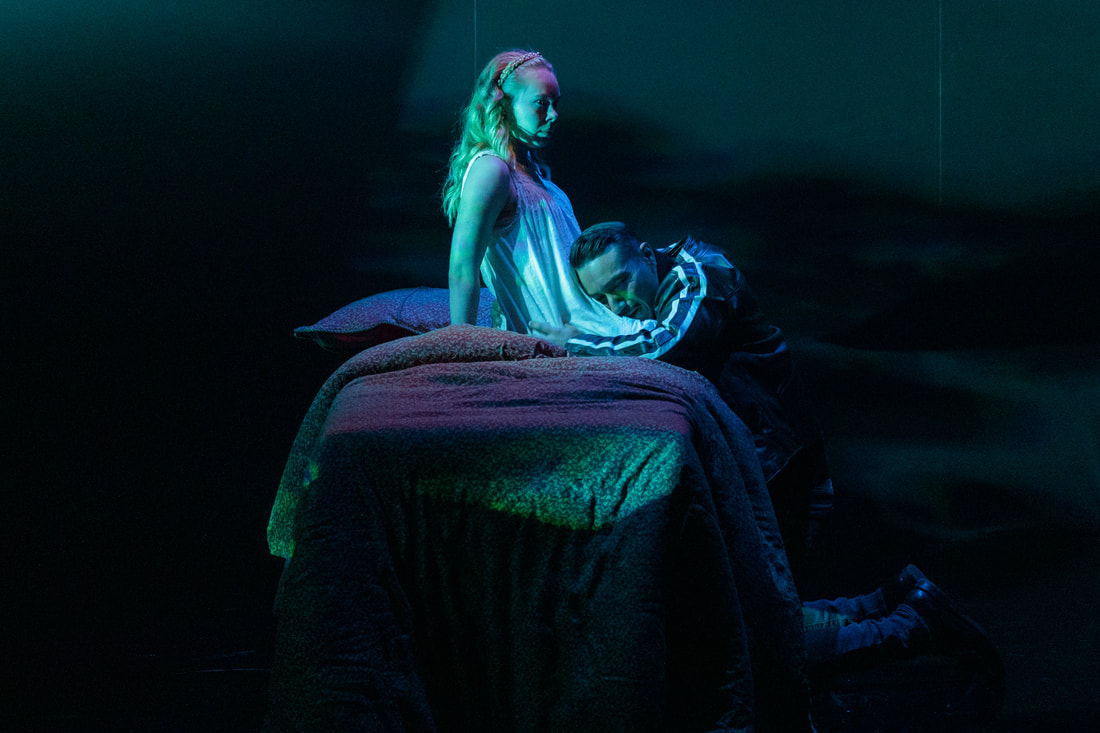|
Olivia Hodson and Steven Lone in "The Virgin Trial." Karli Cadel Photography In the contemporary parlance of playwright Kate Hennig’s 15-year-old Elizabeth Tudor, she finds herself “locked up and knocked up.” But the future Queen Elizabeth I in Hennig’s “The Virgin Trial” is much more embattled than that. She’s under fire from both a sadistic noblewoman and from the Lord Protector to Bess’ brother, the reigning boy king Edward. They’re rabid to prove that she was complicit in a murderous plot to ultimately gain the throne herself.
This political intrigue boils at the surface of the second of Hennig’s “Queenmaker Trilogy” plays about the Tudor queens. Her first, “The Last Wife,” was produced at Old Town’s Cygnet Theatre last year under the direction of Associate Artistic Director Rob Lutfy. One of the most riveting dramas of 2018 on San Diego stages, it told the story of Henry VIII’s sixth and final wife, Katherine Parr, and how in pursuing her passion and independence she defied the very foundation of the monarchy. Cygnet’s Lutfy is at the helm again with “The Virgin Trial,” in which Bess (Olivia Hodson), the youngest (after Mary) of the late Henry’s two legitimate daughters, is suspected of having taken to her bed her stepmother Katherine’s husband, Thom Seymour (Steven Lone, who played the same role in “The Last Wife”). Thom is arrested after a failed attempt to kill young Edward VII. Katherine has died in childbirth, and the political establishment’s fierce contempt of her has magnified and redirected itself at Elizabeth. The Lord Protector (Tom Stephenson), who is also Thom’s brother, and the lady of the court (Lisel Gorell-Getz) are either grilling Elizabeth using the good cop/bad cop bit (and in an intentional anachronism using a tape recorder), or torturing Bess’ governess (Monique Gaffney) and secretary (Wil Bethmann) by means that, contemporarily speaking, bring to mind Abu Ghraib. If there’s theatrical shock value in that, or less so in the play’s occasional profanity, it doesn’t diminish what Hennig is saying about the girl “on trial” and the woman and omnipotent monarch she would become. At only 15 years old, Elizabeth is a still caught up in the fears and fantasies of a child, but emerging with chilling resolve is a woman who will bow to no one, a woman whom she says will never be “average.” “A virgin,” Bess professes in a moment of supreme self-enlightenment, “is a vessel for creation.” In this vein, she not only exalts her virginity but confidently tells her exasperated sister Mary (Brittney M. Caldwell) that in spite of events she will regain it. You can’t help but believe her. Hodson admirably balances this dichotomy between Bess the woman-child and Bess the sovereign-to-be. As Thom, tortured by urges carnal and ambitious, Lone has a much meatier part than he had in “The Last Wife.” His scenes with Hodson are uncomfortable, as they should be. Caldwell’s Mary comes off as the most 21st-century sounding of all of Hennig’s characters. It is Mary, in fact, who is the subject of the third play in the “Queenmaker Trilogy,” titled “Mother’s Daughter.” Could that one, too, be in Cygnet’s future? It’s a tantalizing thought. (Review originally published in The San Diego Union-Tribune on 9/17/19.)
0 Comments
Leave a Reply. |
AuthorDavid L. Coddon is a Southern California theater critic. Archives
July 2024
Categories |
David Coddon |
|
